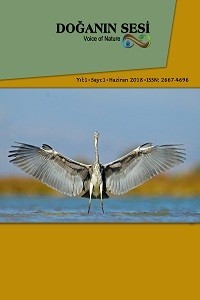TÜRKİYE’NİN KİRAZKUŞLARI (PASSERIFORMES: EMBERIZIDAE)
Passeriformes takımı altında yer alan Emberizidae familyasının bazı üyeleri yeni taksonomik çalışmalarla farklı familyalara dâhil edilmiş ve sonuç olarak familya sadeleşerek tek bir cinsiçeren bir aile olmuştur. Emberizidae ailesinden ayrılan türler 2 yeni aile oluşturmuş ve toplamda 3 farklı aileye ayrılmıştır. Türkiye’de bulunan kirazkuşlarından ikisi de ayrılarak Calcariidae familyasında yer almıştır. Mevcut güncel veriler ışığında Türkiye’de kaydedilen ve Emberizidae familyasındaki tek cins olan Emberiza cinsinde bulunan 14 türün sistematiği, biyolojik ve ekolojik özellikleri ile dağılım bilgileri bu makale kapsamında değerlendirilmiştir.
Anahtar Kelimeler:
Passeriformes, Ötücü Kuşlar, Emberizidae, Kiraz Kuşu
Buntings of Turkey (Passeriformes: Emberizidae)
According the recent taxonomic studies some members of Emberizidae family in Passeriformes ordo have been split into several families and, hence Emberizidae is simplified and became a family with one genus. The species separated from the Emberizidae family consisted 2 new families and in total they were spread into 3 families. Two of the buntings in Turkey were also separated and included in the Calcariidae family. In this article, the current available data on the 14 species of the Emberizidae family in Turkey have been assessed for their systematics, biological and ecological characteristics and distribution information.
Keywords:
Passeriformes Passerines, Emberizidae, Bunding, Bird,
___
- Anonim. (2012). “Türkiye Ulusal Halkalama Çalışmaları Raporu 2012”. Orman ve Su İşleri Bakanlığı Doğa Koruma ve Milli Parklar Genel Müdürlüğü, Ankara. 14 s.
- Anonim. (2017). “Türkiye Ulusal Halkalama Çalışmaları Raporu 2017”. Orman ve Su İşleri Bakanlığı Doğa Koruma ve Milli Parklar Genel Müdürlüğü, Ankara. 32 s.
- BirdLife International. (2015). “European Red List of Birds”. Luxembourg: Office for Official Publications of the European Communities.
- BirdLife International. (2016). Emberiza rustica. The IUCN Red List of Threatened Species 2016: e.T22720960A89641304. http://dx.doi.org/10.2305/IUCN. UK.2016-3.RLTS.T22720960A89641304.en. (erişim 29 Aralık 2018).
- BirdLife International. (2017). Emberiza (amended version of 2016 assessment). The IUCN Red List of Threatened Species 2017: e.T22720881A111133257. http://dx.doi.org/10.2305/IUCN.UK.2017-1.RLTS. T22720881A111133257.en. (30 Aralık 2018)
- Copete, J.L. (2018). Pine Bunting (Emberiza leucocephalos). In: del Hoyo, J., Elliott, A., Sargatal, J., Christie, D.A. & de Juana, E. (eds.). Handbook of the Birds of the World Alive. Lynx Edicions, Barcelona. (retrieved from https://www.hbw. com/node/61863 on 30 December 2018).
- Copete, J.L., Christie, D.A. (2018). Reed Bunting (Emberiza schoeniclus). In: del Hoyo, J., Elliott, A., Sargatal, J., Christie, D.A. & de Juana, E. (eds.). Handbook of the Birds of the World Alive. Lynx Edicions, Barcelona. (retrieved from https://www.hbw.com/node/61900 on 30 December 2018).
- Copete, J.L., Garcia, E.F.J., Sharpe, C.J. (2018). Rustic Bunting (Emberiza rustica). In: del Hoyo, J., Elliott, A., Sargatal, J., Christie, D.A. & de Juana, E. (eds.). Handbook of the Birds of the World Alive. Lynx Edicions, Barcelona. (retrieved fromhttps://www.hbw.com/node/61884 on 30 December 2018).
- del Hoyo, J., Elliott, A., Sargatal, J., Christie, D.A., de Juana, E. (eds.). (2018). “Handbook of the Birds of the World Alive.” Lynx Edicions, Barcelona. https://www.hbw.com/ node/52381 (erişim 30 Aralık 2018)
- Ebird. 2018. https://ebird.org/explore (erişim tarihi: 28.12.2018)
- Gill, F., Donsker, D. (Eds). (2018). IOC World Bird List (v 8.2). http://www.worldbirdnames.org/ (erişim tarihi: 27.12.2018).
- Kirwan, G., Boyla, K.A., Castell, P., Demirci, B., Özen, M., Welch, H., Marlow, T. (2008). The Birds of Turkey. 511 s. Londra: Christopher Helm.
- Madge, S. (2018). “Grey-necked Bunting (Emberiza buchanani)”. In: del Hoyo, J., Elliott, A., Sargatal, J., Christie, D.A. & de Juana, E. (eds.). “Handbook of the Birds of the World Alive” Lynx Edicions, Barcelona. (retrieved from https:// www.hbw.com/node/61869 on 30 December 2018).
- Madge, S., de Juana, E. (2018). “Corn Bunting (Emberiza calandra)”. In: del Hoyo, J., Elliott, A., Sargatal, J., Christie, D.A. & de Juana, E. (eds.). Handbook of the Birds of the World Alive. Lynx Edicions, Barcelona. (retrieved from https:// www.hbw.com/node/61861 on 30 December 2018).
- Madge, S., Sharpe, C.J. (2018). “Cinereous Bunting (Emberiza cineracea)”. In: del Hoyo, J., Elliott, A., Sargatal, J., Christie, D.A. & de Juana, E. (eds.). Handbook of the Birds of the World Alive. Lynx Edicions, Barcelona. (retrievedfrom https://www.hbw.com/node/61870 on 30 December 2018).
- Perrins, C. (1987). “Vögel: Biologie, Bestimmen, Ökologie”. Hamburg: Pareys Verlag. Rising, J., Bonan, A. (2018). “Old World Buntings (Emberizidae)”. In: del Hoyo, J., Elliott, A., Sargatal, J., Christie, D.A., de Juana, E. (eds.). “Handbook of the Birds of the World Alive”. Lynx Edicions, Barcelona. (retrieved from https://www.hbw.com/node/52381 on 30 December 2018).
- Roselaar, C.S. (1995). “Taxonomy, morphology, and distribution of the Songbirds of Turkey: an atlas of biodiversity of Turkish passerine birds”. Haarlem: GMB.
- Snow, D.W., Perrins, C.M. (1998). “The Birds of the Western Palearctic”. Oxford University Press, Oxford.
- Trakuş. (2018). “Türkiye’nin Anonim Kuşları” http:// www.trakus.org/kods_bird/uye/?fsx=tur_arama (erişim tarihi: 29.12.2018)
- Yayın Aralığı: Yılda 2 Sayı
- Başlangıç: 2018
- Yayıncı: Doğa ve Sürdürülebilirlik Derneği
Sayıdaki Diğer Makaleler
GELECEK NESİLLERE YAŞANABİLİR BİR DÜNYA BIRAKMANIN ANAHTARI: EKOLOJİK OKURYAZARLIK
ARAPLAR BOĞAZI (KARAMENDERES VADİSİ, ÇANAKKALE) VE CİVARININ HERPETOFAUNA VE AVİFAUNASI
Cemal Varol TOK, Ulvi Kerem GÜNAY, Batuhan Yaman YAKIN, Çiğdem KAPLAN
